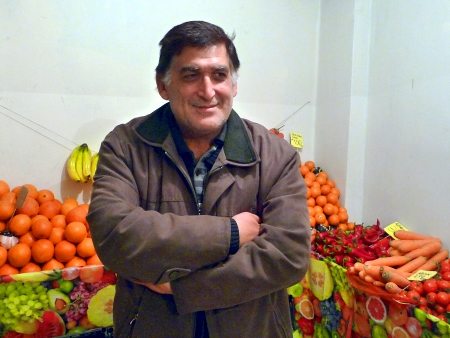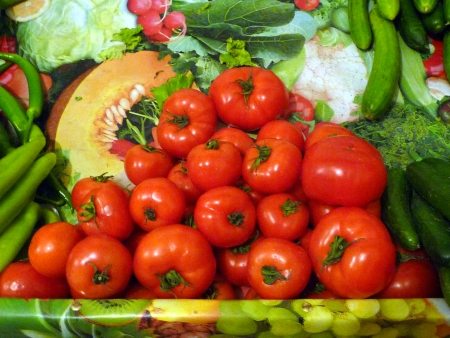The poet grocer
Tomatoes, leeks, potatoes, oranges, zucchini, peppers, cucumbers, bananas, lemons – all carefully laid out in a small shop in the Kadıköy district of Istanbul. This green grocer’s couldn’t seem more ordinary. But Faruk Çukurovalı represents an excessively rare subgenre of fruit and vegetable sellers: he is a Poet Grocer. A wordsmith with many hats and many lives, he also works as a therapist for autistic children. Comfortably seated in his modest office, he told Mashallah News a bit about himself and the very full life he has lead.
Faruk Çukurovalı was born in 1960 in Dört Yol, Hatay Province (Antioch), in the southern tip of Turkey which flanks the Syrian border. It is a place which does not inspire great nostalgia in Faruk. “I was born in a cave” is his choice of words to describe the conservative society in which he grew up and where he quickly learned to feel himself an outsider.
His father, a dolmuş (minibus) driver, encouraged him to attend the technical school in Iskenderun, where he had his first poetic revelation. “Since childhood, I had something in me, but I did not know what. One day the teacher gave us a written exercise to describe what we saw around us. Everyone wrote a page-long editorial on the landscape… and I wrote a quatrain about a leaf. The teacher took my sheet, showed it to the others and said: ‘Your classmate has said it all in four lines!’”
The beginning of a career? Not really. Turkey was very unstable in the late ’70s and not a particularly nurturing environment for aspiring poets. Faruk instead began working at Iskenderun’s steel factory. “When I got off the train, the workers threw stones at me because I had long hair,” he recalls. After, he continued his studies at the Faculty of Technical Education at Gazi University in Ankara in 1980. After graduation, he returned to teach a few years in the high school where he had studied before being transferred to Diyarbakir in Eastern Turkey, far from his childhood home.
There, in an environment remote from everything he had known, he was overcome by feelings of isolation. For only the second time, he wrote a poem one morning upon waking. He then began to send his poetry to local newspapers on a regular basis. In 1990, at age 30, his calling as a poet resurfaced after many years lying dormant. In the meantime, Faruk Çukurovalı married a girl from Iskenderun. The marriage was arranged by his relations: “In my family, you have to marry the girl named by the elders of the family. It is stronger than tradition; it is töre, customary law. It is impossible to choose the woman you want. We made this mistake. The marriage never worked.”
In 1994, when he had been married for seven years and fathered four children — a daughter and three sons — he decided to end the marriage. It involved cutting all ties to his family, although he was able to continue seeing his children. To escape the constraints of existence under töre, he went first to Mardin, and then to Turkish Cyprus in 1997 where he is still a teacher at a technical school.
Returning to Turkey in 2001, he was faced in one year later with the death of his sister in a train accident in Adana, the great metropolis of southern Turkey, where he was then working. “The day I lost my sister, I felt extreme emotions,” he says. “I went into another world, my experience of emotions became more profound. I was transformed; this shock truly opened my mind to poetry.”
It was during this time that poetry began to take a prominent place in Faruk’s life. He resumed university studies in Turkish literature, then went to Ankara to teach and enrolled in a Master’s degree in speech therapy. There, friends introduced him to Melisa — a young girl with autism who he taught to speak and to write over a period of two years. From their close relationship was born a story and Faruk’s second calling, in the pre-school education of autistic children — something parents cannot count on the state to provide.
He continues to write poems which have appeared in various newspapers and literary journals, and his first book, entitled sarışın yalnızlıklar (The blonde lonelinesses) was published in 2007. Retired from the national education system, he got remarried in 2009 to a woman from Trabzon and opened ‘Karadeniz manavı’ (Black Sea Grocery) in Istanbul on a small street in Kadıköy, which allows him to supplement his pension. At the back is the door to his apartment where he gives private lessons, mostly voluntary, for children with autism. Sometimes surrounded by students who have come to lend a hand or other neighbourhood kids, he continues to write — “mainly short stories” he says. Faruk has flourished in this universe, in the midst of children, tomatoes and words, on the last leg of his journey as a teacher-poet-grocer whose life reads like a novel.
Kayıp Şovalye
Oralarda bir yerde gömülüyüm
Aklınızın ortasında
İsmim
İki harf’i kapsasa da
Sekiz anlamlı.
Vasiyetimi,
Hahamlar yazmış olmalı
Ağaç kabuklarına
Epigraf şifrelerle
Bulunduğumda
Güneş oğlak burcundan yükselip
Boğa burcunun dirilişine
Tanık olacak
Yükseklerdeki
Yaz güneşinden
Yeryüzündeki göğün
Göksel yöneticisine
Aynı kolonilerdeki ihtişamımızı
Anlatırken;
Karınca kemiklerimde dans edecekler
Çıktığım enkazda bok böcekleri.
Yer yüzüne,
Beni en iyi sen anlatırsın
Kayıp şovalye
PALİ-CANON…
The Lost knight
I am buried nearby
In the heart of your memories
My name
Even composed by two letters only,
Has eight meanings.
My will
Must have been written by rabbis
On tree barks
With epigraphic codes
In my presence
The sun, after rising from the Capricorn,
Will be the witness
Of the Taurus resurrection
While I will tell
Our splendors in the same colonies
The summer sun
Hanging from the atmosphere
To the celestial ruler
Of the sky on this earth;
The ants will dance in my bones
And the dung beetles, on the debris from whence I came.
It is you who tell me the best
To this earth
The lost knight
PALI-CANON…
Translation from French to English: Erin O’Halloran.
9 thoughts on “The poet grocer”
Leave a Reply
You must be logged in to post a comment.









I wish I could read his piece about the leaf!
yeşilin gölgesinde eskiyor zaman,
arkasından bakışanları hiç umursamadan…
hüzünlerimize soluk bir akşamüstü bırakarak..
Poet grocers are rare indeed! Thanks for sharing his story.